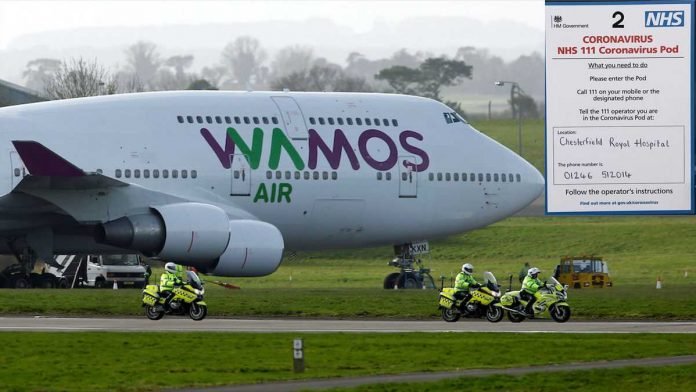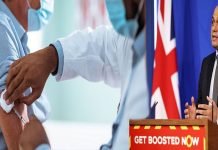British nationals evacuated from a coronavirus-hit cruise ship in Japan have arrived at a hospital where they will spend the next two weeks in quarantine. Meanwhile local hospitals see coronavirus quarantine pods at the ready.
Coaches carrying 30 British and two Irish citizens arrived at Arrowe Park hospital in Wirral on Saturday evening. The group had travelled from an airbase in Wiltshire after leaving Tokyo on a flight late on Friday night.
They have so far tested negative for the virus.
Evacuees from the Diamond Princess got to Arrowe Park Hospital – where they will spend another two weeks – just before 6pm after landing back in the country on Saturday morning.
One passenger among the 30 Britons and two Irish citizens were seen to make made a heart sign with her hands while another gave an “okay” signal through a coach window.
Arrowe Park Hospital was previously used to quarantine 83 British nationals who were flown back to the UK from Wuhan.
The chief executive of Wirral Teaching Hospital NHS Trust, Janelle Holmes, said Arrowe Park was using that experience as a “blueprint” for treating the new group.
Speaking ahead of the group’s arrival, she said: “The group of people is slightly different.
“Obviously, they have come from a cruise ship rather than from their own homes over in China, but we are working exactly the same as we did before, with the healthcare professionals and Public Health England to make sure they are safe, well managed and comfortable while they are with us.”

The evacuation flight took off from Tokyo’s Haneda Airport late on Friday evening (GMT) and landed at Boscombe Down, a Ministry of Defence base in Wiltshire, about 11:30 GMT on Saturday.
In a statement issued after the plane landed, Foreign Secretary Dominic Raab said the Foreign Office had “worked hard” to get the passengers “back to the UK securely”.
“Our number one priority has consistently been the health and safety of UK nationals,” he added.
The flight had previously been delayed after the British embassy said it was “logistically complicated”.
Meanwhile, it has emerged the NHS is working on plans to test people for coronavirus in their own homes, if the outbreak begins to spread in the UK.
A pilot scheme has already been launched in London, where tests are being carried out by NHS nurses and paramedics.
The health service is planning to expand the scheme to other areas outside of the capital in the coming weeks.
Professor Keith Willett, the NHS strategic incident director for coronavirus, said the aim was to avoid the risk of people spreading the infection by going to their GP or A&E.
Elsewhere, Italy has reported its second death from the virus – a woman living in the northern region of Lombardy – a day after a 78-year-old man died.
Local hospitals see ‘Coronapods’ outside entrances

The pods have appeared at Chesterfield Royal Hospital.
Self-quarantine coronavirus pods have been installed at Chesterfield Royal Hospital ‘to help to contain the potential spread of infection’.
The pods, which are kitted out with ‘appropriate equipment and signage’, are part of the government and Health Protection England’s national plans for the containment phase of coronavirus.
The trust which runs the Royal says all hospitals in the country have been instructed to put pods in place.
A statement issued by the Chesterfield Royal Hospital NHS Foundation Trust says: “Whilst there are no confirmed cases of Coronavirus in this area or at our hospital, the pods are precautionary measures to help to contain the potential spread of infection if needed.”

The statement adds: “Anyone arriving at our Emergency Department (A&E) because they believe they have coronavirus symptoms, but haven’t followed the NHS 111 call procedure, will not be able to enter the building.
“Instead signs instruct them to use one of the pod facilities to make that call to NHS 111 in a safe environment – reducing the risk of infection to others.”
The NHS 111 service remains ‘the first and correct point of contact’ for anyone who believes they may have the virus.
Director of nursing and patient care, Lynn Andrews, said: “I can assure everyone that we are following national guidance from Public Health England (PHE) to make sure we are well-prepared to respond to the new 2019 novel Coronavirus. I am really proud of how our staff have worked together to get everything in place in just a few days.
“Our hospital is running services as we would normally – and it’s very much business as usual. Although we have put Coronavirus pods in place as a sensible safety precaution, anyone concerned about their symptoms must call NHS 111.
“The NHS 111 team is best placed to advise individuals in the first instance, especially if they have travelled from any of the countries on the PHE’s list. As always the best way of preventing the spread of infection is good hygiene practices, such as regularly washing hands and always sneezing into a tissue.”
Help Us Sustain Ad-Free Journalism
Sorry, I Need To Put Out the Begging Bowl
Independent Journalism Needs You
Our unwavering dedication is to provide you with unbiased news, diverse perspectives, and insightful opinions. We're on a mission to ensure that those in positions of power are held accountable for their actions, but we can't do it alone. Labour Heartlands is primarily funded by me, Paul Knaggs, and by the generous contributions of readers like you. Your donations keep us going and help us uphold the principles of independent journalism. Join us in our quest for truth, transparency, and accountability – donate today and be a part of our mission!
Like everyone else, we're facing challenges, and we need your help to stay online and continue providing crucial journalism. Every contribution, no matter how small, goes a long way in helping us thrive. By becoming one of our donors, you become a vital part of our mission to uncover the truth and uphold the values of democracy.
While we maintain our independence from political affiliations, we stand united against corruption, injustice, and the erosion of free speech, truth, and democracy. We believe in the power of accurate information in a democracy, and we consider facts non-negotiable.
Your support, no matter the amount, can make a significant impact. Together, we can make a difference and continue our journey toward a more informed and just society.
Thank you for supporting Labour Heartlands












